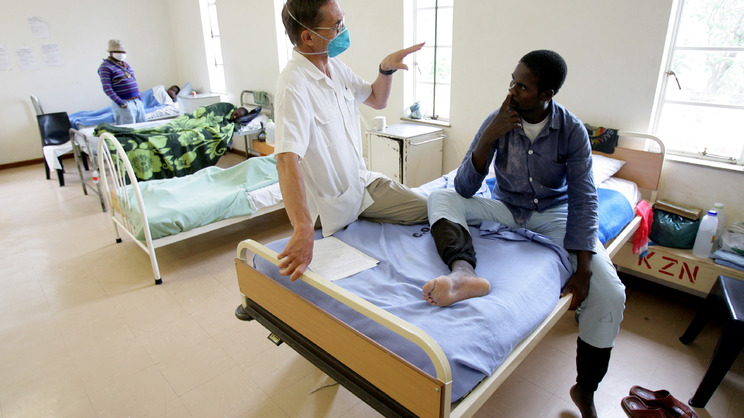South Africa's Health Minister Aaron Motsoaledi played a leading role in convening government heads at a United Nations meeting this week. (Gallo)
For the first time in the history of the United Nations (UN), the body hosted a high-level meeting of heads of states to talk about TB.
Major epidemic diseases are considered global security threats. That is why government heads discussed HIV at a high-level UN meeting in 2001, 2011 and 2016. Ebola was a topic in 2014 and antimicrobial resistance (when antibiotics used for many decades are no longer effective) in 2016. Non-communicable diseases such as cancer, diabetes, hypertension and cardiovascular diseases were deliberated on in 2011 and 2014 and were focused on again in the General Assembly this week.
But one disease — the infectious disease that kills the most people — was ignored and hadn’t made a blip on the UN’s radar.
Until this week.
This disease is TB — the condition we know so well in South Africa. You may wonder why I’m making a big issue about an illness that has been around for centuries and has never been regarded as a crisis.
Today I’m informing you that TB has indeed become a huge global health security threat.
Here are the facts: over the past 200 years TB has killed more people than malaria, cholera, yellow fever, the bubonic plague, influenza, polio, Ebola and HIV combined.
In 2017, 10 million people developed active TB globally, according to the World Health Organisation’s 2018 Global TB report. The disease killed 1.6-million people — more than 4 000 people each day.
Is it not surprising that such a big killer was ignored by global powers?
 Late president Nelson Mandela had TB while in prison. In 2004, he warned that the world wasn’t taking the disease seriously enough.
Late president Nelson Mandela had TB while in prison. In 2004, he warned that the world wasn’t taking the disease seriously enough.
It’s not that international leaders didn’t know about TB. Fourteen years ago, South African world icon Nelson Mandela, whose legacy is being celebrated at this year’s General Assembly, warned: “The world has made defeating Aids a top priority. This is a blessing. But TB remains ignored.”
At the 2004 International Aids conference in Bangkok he pleaded: “Today we are calling on the world to recognise that we can’t fight Aids unless we do much more to fight TB as well.”
Why have international leaders not taken Madiba’s warning seriously?
In my opinion, it’s because other diseases kill people in much more dramatic ways than TB. They bring trauma and panic.
TB, on the other hand, is not a drama queen. It kills silently and slowly. Nevertheless, it’s an extremely effective killer.
Because of its silence and slowness it doesn’t prod anyone into action — unlike HIV, Ebola, malaria and other infectious diseases.
This is what makes TB so extraordinarily dangerous.

In 2017, TB killed 1.6-million people globally — despite the fact that it’s curable.
In 2001, the World Health Organisation (WHO) established an organisation called the Stop TB Partnership Board. Its role is to implement programmes to fight TB. The Stop TB Partnership Board is hosted under the umbrella of the United Nations Office for Project Services, or Unops.
I’m the chairperson of the Stop TB Partnership Board.
In 2016 I was invited, in my capacity as the chairperson, to participate in a UN high-level meeting to discuss antimicrobial resistance. I had information at my disposal that one third of antimicrobial resistance was due to TB (which is treated with antibiotics). It was therefore of great concern to me that the UN would discuss antimicrobial resistance but ignore TB.
I pointed out that the world has already lost one third of the war against antimicrobial resistance but nothing is done about TB. I argued that TB should also be given the opportunity to be debated by heads of states.
The South African Mission at the UN, led by Ambassador Jerry Matjila, then mobilised countries including Norway, France, Thailand, Senegal, Indonesia and Brazil to support this mission. These nations, led by South Africa, sponsored a motion urging the UN to host a high-level meeting on TB.
This meeting happened this week. It was a dream come true and South Africa ought to be very proud of this achievement.
Watch: Data-driven TB: Using the numbers to find SA’s missing patients
In preparation for the meeting, the WHO and the Russian Federation, together with the Stop TB Partnership, organised a ministerial meeting in Moscow in November. The meeting was opened by the President of the Russian Federation Vladimir Putin and addressed by the deputy secretary general of the UN, Amina Mohamed, the director general of the WHO, Tedros Ghebreyesus, Unaids’ executive director, Michel Sidibe. Eighty health ministers and 2 000 delegates attended.
At the ministerial meeting, it was agreed that five priorities, called the “five asks”, must feature at the UN meeting. These range from finding resources to prevent, diagnose and successfully treat all those with TB and support for further research and development.
We are hopeful that this debate and the political declaration that was signed, will usher in a new era that will enable countries to eradicate the world’s biggest silent killer by 2030 or earlier.
Aaron Motsoaledi is the minister of health and the chair of the Stop TB Partnership Board.